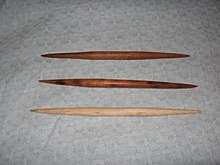The Bagakay is an ancient Filipino weapon made of bamboo.[1] It is a two pointed wooden dart type of weapon about ten inches in length[2] thrown at an enemy at close quarters and were generally thrown five at a time increasing the possibility of hitting the target.[3] It can be made from small tree branches cut in the proper length and sharpened at both ends or made from hollow bamboo filled with clay for additional weight and easy throwing.[4]
| Bagakay | |
|---|---|
 | |
| Type | Projectile Dart, Spear |
| Place of origin | Philippines |
| Service history | |
| Used by | Filipinos |
| Wars | Spanish colonization of the Philippines |
| Specifications | |
| Length | 6-10 inches |
History
editThe bagakay was usually used to hunt birds before the Spanish Colonial period. It has evolved into a projectile weapon against the Spanish colonists during the colonization era.[5] Bagakay may also connote a long bamboo spear[6]
References
edit- ^ "Intersections: The Philippines at the Turn of the Sixteenth Century". intersections.anu.edu.au. Retrieved 21 December 2021.
- ^ Sr, Amante P. Marinas (10 December 2013). The Art of Throwing: The Definitive Guide to Thrown Weapons Techniques (Downloadable Media Included). Tuttle Publishing. ISBN 978-1-4629-0551-5. Retrieved 21 December 2021.
- ^ Mallari, Perry Gil S. (21 July 2009). "The FMA and the Projectile Range". Filipino Martial Arts Pulse. Retrieved 21 December 2021.
- ^ Sr, Amante P. Marinas (10 December 2013). The Art of Throwing: The Definitive Guide to Thrown Weapons Techniques (Downloadable Media Included). Tuttle Publishing. ISBN 978-1-4629-0551-5. Retrieved 21 December 2021.
- ^ Robertson (1873–1939), Emma Helen Blair (d 1911) James Alexander. The Philippine Islands, 1493–1898: explorations by early navigators, descriptions of the islands and their peoples, their history and records of the catholic missions, as related in contemporaneous books and manuscripts, showing the political, economic, commercial and religious conditions of those islands from their earliest relations with European nations to the close of the nineteenth century, Volume XXIX, 1638–40. p. 259. Retrieved 21 December 2021.
{{cite book}}: CS1 maint: numeric names: authors list (link) - ^ Mallari, Perry Gil S. (21 July 2009). "The FMA and the Projectile Range". Filipino Martial Arts Pulse. Retrieved 21 December 2021.